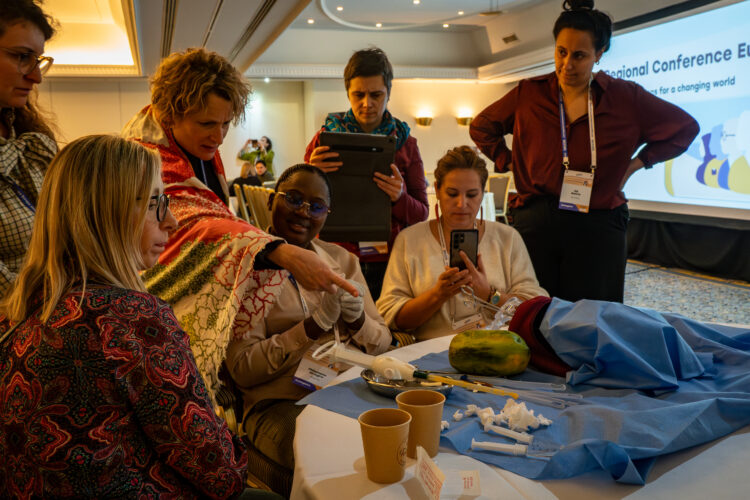Announcing a New Collaboration between FIGO and ICM: Collaborate for Women (C4W)

ICM and the International Federation of Gynecology and Obstetrics (FIGO) have a strong relationship and long-standing tradition of consultation and collaboration. Our newest joint initiative, Collaborate for Women, Abortion and Contraception Care Together (C4W ACCT) provides an opportunity to further develop our collaborative processes.
C4W is an initiative by ICM and FIGO, with technical input and background engagement from the World Health Organization (WHO), and the UN’s Special Programme in Human Reproduction (HRP). ICM and FIGO are working with their respective national associations to enhance the capacity of both professions to deliver quality family planning (FP) and comprehensive abortion care (CAC) services in Nepal, Bangladesh, Democratic Republic of the Congo (DRC), Sierra Leone and Mozambique.
Universal access to services
Collaboration between midwives and obstetrician-gynecologists (ob-gyns) is crucial to ensuring that every woman has access to family planning services. This includes access to a range of contraceptive methods and accurate information to make informed decisions about whether, when, and how many children to have. Family planning enables individuals and couples to achieve their reproductive goals, including the ability to avoid unintended pregnancies, plan and space their pregnancies, and maintain overall reproductive health (1).
Although the use of modern contraceptives has risen globally, data shows that 164 million women of reproductive age still lack access to contraception (2). Unintended, unwanted, and mistimed pregnancies remain major factors contributing to maternal mortality and morbidity, with unsafe abortion complications responsible for 8% of all maternal deaths (3). Furthermore, one in four individuals who survive unsafe abortions face enduring health issues, including damage to internal organs, infertility, and mental health challenges (4). Sexual and reproductive health rights are acknowledged as fundamental human rights under international law. Human rights treaties oblige states to implement measures that protect women from unsafe abortions, including the liberalization of restrictive laws and guaranteeing timely access to quality care upon a woman’s request, free from the need for third-party consent (5).
Competency-based education and service availability
Quality pre- and in-service education is critical to ensure that both the incoming generation of healthcare professionals, and those already in practice, have the knowledge, skills and attitudes required to provide FP and CAC services safely, effectively and respectfully. This requires implementation of Competency-based education (CBE), an outcome-based approach to learning that situates knowledge and skills in the context of practice. CBE is often inadequately covered or entirely missing from medical curricula and needs strengthening in many midwifery curricula.
Ongoing collaboration and workforce optimisation is vital for creating and sustaining a multi-professional workforce that has the capacity to increase access to services, grounded in the latest evidence and best practice recommendations from WHO (5,6). This includes the provision of innovative solutions such as home-based, self-care and accessible primary healthcare and facility-based services, including effective referral and consultation processes that ensure high quality care even when complications arise (5,6).
A commitment to respectful collaboration and empowering care
ICM and FIGO commit to acknowledging and addressing the harmful effects of discrimination, stigma, and stereotypes on women’s autonomy. We also commit to bridging gaps between midwives and ob-gyns caused by historical hierarchies, using a Gender Transformative Approach to support mutual respect, shared learning, and trust-building.
FIGO and ICM believe that C4W will result in the development of inclusive and facilitatory processes that see midwives and ob-gyns being better equipped to provide innovative respectful women-centered care on a national level and increase professional understanding and cooperation on a global level.
References
- Bearak, J. M., Popinchalk, A., Beavin, C., Ganatra, B., Moller, A. B., Tunçalp, Ö., & Alkema, L. (2022). Country-specific estimates of unintended pregnancy and abortion incidence: a global comparative analysis of levels in 2015-2019. BMJ global health, 7(3), e007151. https://doi.org/10.1136/bmjgh-2021-007151
- United Nations Department of Economic and Social Affairs, Population Division (2022). World Family Planning 2022: Meeting the changing needs for family planning: Contraceptive use by age and method. UN DESA/POP/2022/TR/NO. 4.
- Cresswell JA, Alexander M, Chong MYC, Link HM, Pejchinovska M, Gazeley U, Ahmed SMA, Chou D, Moller AB, Simpson D, Alkema L, Villanueva G, Sguassero Y, Tunçalp Ö, Long Q, Xiao S, Say L. Global and regional causes of maternal deaths 2009-20: a WHO systematic analysis. Lancet Glob Health. 2025 Mar 7:S2214-109X(24)00560-6. doi: 10.1016/S2214-109X(24)00560-6. Epub ahead of print. PMID: 40064189.
- Haddad LB, Nour NM. Unsafe abortion: unnecessary maternal mortality. Rev Obstet Gynecol. 2009 Spring;2(2):122-6. PMID: 19609407; PMCID: PMC2709326.
- Abortion care guideline. Geneva: World Health Organization; 2022. Licence: CC BY-NC-SA 3.0 IGO.
- Family planning and comprehensive abortion care toolkit for the primary health care workforce. Volume 1. Competencies. Geneva: World Health Organization; 2022 (Family planning and comprehensive abortion care toolkit for the primary health care workforce). Licence: CC BY-NC-SA 3.0 IGO.
- ICM Essential Competencies for Midwifery Practice. The Hague: International Confederation of Midwives; 2024. Licence: CC BY-NC-SA 4.0.
- ICM Global Standards for Midwifery Education.